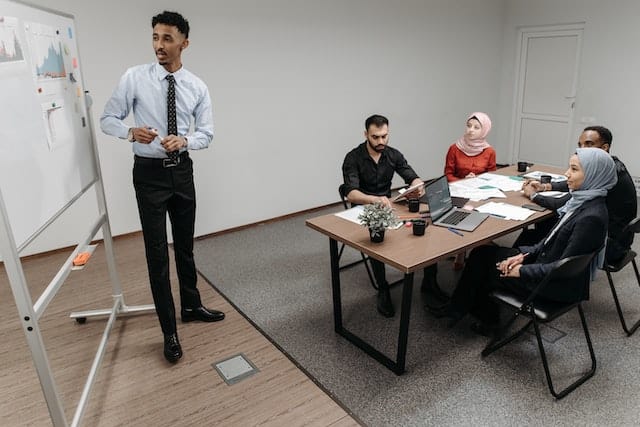First published: March 10, 2023 @ 6:00 pm
Critical thinking is an essential soft skill that everyone needs to develop in today’s complex world.
It helps us analyze information, evaluate arguments, and make informed decisions. It is also important for problem-solving and creativity, as well as for making connections and understanding complex ideas.
Critical thinking skills are essential for success in various fields, including business, education, healthcare, and politics.
Employers benefit from critical thinking in the workplace by finding multiple solutions to problems, effective communication between teams and individual employees, and improved decision making.
Moreover, critical thinking can help employees identify potential risks and develop strategies for avoiding them.
So, with the right critical thinking skills, you can improve your performance, increase your productivity and become a better decision-maker.
In this article, we will explore the top critical thinking skills and how they can help you succeed in your professional life.

What is Critical Thinking?
Critical thinking is a mental process that involves analyzing, evaluating, and interpreting information to make informed decisions or judgments.
It requires the ability to identify and question assumptions, evaluate evidence, and draw logical conclusions based on evidence.
Critical thinking is an essential skill in today’s complex world, as it enables individuals to navigate and make sense of the vast amounts of information available.
It also allows individuals to make well-informed decisions that are based on evidence rather than emotions or opinions.
What are the Top Critical Thinking Skills?
Here are some of top critical thinking skills that you need to develop.
1. Analytical Thinking
Analytical thinking is the process of breaking down complex problems into smaller parts in order to gain a better understanding of the entire situation.
This skill is often used in a professional setting to solve problems and make decisions, as it requires logical reasoning and critical analysis.
Analytical skills also require a person to look at the data and facts objectively, identify pattern, in order to draw valid conclusions based on the available information.
This type of thinking helps to determine the most suitable solutions for a particular issue, paving the way for successful decision-making based on evidence.
To develop your analytical skills, you need to ask questions, examine assumptions, and gather evidence to support your arguments. You can improve your analytical skills by practicing with real-life scenarios or case studies.
2. Problem-Solving
Problem-solving is one of the most important critical thinking skills. It involves an individual’s ability to analyze a problem, identify its components, come up with potential solutions, and select the best option.
Moreover, problem-solving is not just about finding a solution, but also about understanding the various factors that contributed to the problem in the first place.
Being able to identify these factors and come up with creative solutions to address them is essential in any environment.
Knowing how to think critically is the foundation of problem-solving, and it can be the difference between success and failure in any task.
3. Decision-Making
Decision-Making is the ability to weigh different options and make the best choice in a given situation.
This often requires critical thinking process, such as being able to analyze and evaluate various factors in order to come to a conclusion.
In the workplace, effective decision-making skills are essential for leaders who must choose the best course of action.
Being able to think on the spot and make quick decisions can be beneficial in high-pressure situations, such as when resolving a customer issue and give some effective solutions.
4. Creative Thinking
Creative thinking is a critical thinking skill that enables individuals to come up with unique ideas and solutions to problems.
It requires the ability to think outside the box, come up with novel ideas, and think in an abstract manner. It also involves being able to look at the same problem from different angles and come up with different solutions.
Creative thinking can be used in a variety of contexts, including problem-solving, decision-making, and creative projects.
In order to develop creative thinking skills, it is important to be open-minded and willing to explore new ideas. It is also important to practice brainstorming, as this helps generate a variety of ideas and solutions.
5. Inference Skills
Inference skills enable professionals to quickly draw conclusions from various pieces of data.
From such conclusions, professionals gain insight into the patterns and trends of their field, and are better able to make decisions in their specific industry.
Inference skills also allow professionals to make predictions about future events, based on the information at hand.
For example, if a professional is able to identify a trend in the data, they can use this information to make an educated prediction about how the trend will advance in the future.
Therefore, inference skills are essential for professionals to have in order to effectively utilize data and make well-informed decisions.
To develop your inference skills, you need to evaluate evidence, identify logical connections, and draw conclusions based on the available information.
You can improve your inference skills by practicing with real-life scenarios or case studies.
6. Evaluation
Evaluation is the ability to assess the credibility and relevance of information. It involves analyzing arguments, identifying strengths and weaknesses, and making judgments based on evidence.
To develop your evaluation skills, you need to identify the key points of an argument, examine the evidence presented, and assess the overall quality of the argument.
You can also improve your evaluation skills by practicing with different types of arguments and looking for logical fallacies or weaknesses.
7. Explanation
Explanation is the ability to communicate complex information clearly and concisely. It involves breaking down complex concepts into simpler terms, providing examples and illustrations, and using clear and concise language.
To develop your explanation skills, you need to understand the topic well, organize your thoughts, and use language that is easy to understand.
You can also improve your explanation skills by practicing with different types of topics and explaining them to others.
8. Self-Regulation
Self-regulation is the ability to monitor and control your own thinking and behavior. It involves being aware of your own biases, assumptions, and emotions and taking steps to overcome them.
To develop your self-regulation skills, you need to be aware of your own thought processes, monitor your emotions, and take steps to overcome your biases and assumptions.
You can also improve your self-regulation skills by practicing mindfulness and reflection.

Final Thoughts
In conclusion, critical thinking skills are essential for success in today’s complex world.
By developing these skills, you can become an innovative thinker who is better able to assess, analyze, and understand complex issues.
With a little practice, you can start to develop the skills you need to think critically and make informed decisions.
Remember, developing critical thinking skills takes time and practice, so be patient and persistent in your efforts to improve.
Subscribe to our blog for more information about helpful articles on a variety of business and career topics, and stay tuned to our upcoming articles on WorkDeputy!
FAQs
What are 4 effective ways to think critically?
Some of the effective ways to think critically include practicing active listening, evaluating evidence which already exists, gathering data and opinions, analyzing and evaluating the data, identifying assumptions, establishing significance, making a decision and communicating effectively.
How can you improve your critical thinking skill at work?
To improve your critical thinking skills at work, become more self-aware, develop foresight, or practice active listening.
What makes you a better critical thinker?
To become a better critical thinker, you should question assumptions, become more self-aware, and practice active listening.
How do you practice critical thinking in everyday life?
There is no one-size-fits-all answer to this question, as the best way to practice critical thinking varies depending on the individual and the situation. However, some basic tips for practicing critical thinking in everyday life include being able to ask questions and assess information critically, being able to think on your feet, and being able to take feedback and change your approach based on it.
What are the 3 main critical thinking techniques?
The three main critical thinking techniques are analysis, inference, and evaluation.




